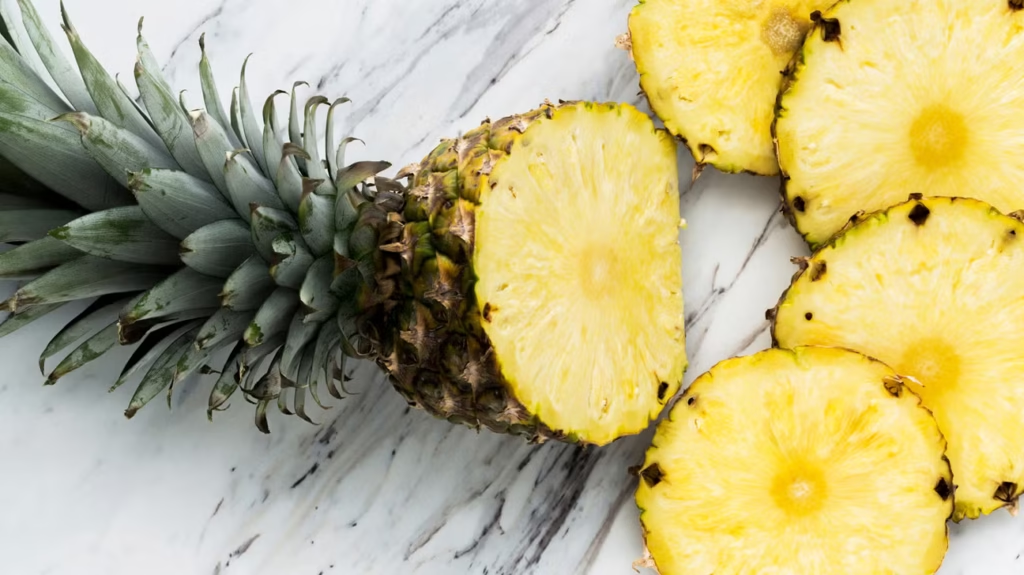Introduction
Pregnancy often brings a wave of curiosity and caution, especially regarding what foods are safe to eat. Among the many fruits that raise questions, pineapple tops the list. Many women hear that eating pineapple while pregnant can cause miscarriage or induce early labor. But is there any truth behind this claim, or is it simply a myth passed through generations? The reality is that pineapple can actually be a healthy and delicious part of your pregnancy diet when eaten in moderation.
It’s rich in nutrients like vitamin C, fiber, and antioxidants—key components for a healthy pregnancy. However, certain precautions and serving limits must be observed to avoid discomfort or side effects. This article explores the science, benefits, potential risks, and safe ways to enjoy pineapple while pregnant, offering clarity and reassurance for expecting mothers who want to make the best dietary choices.

Why Pineapple Is Often Questioned During Pregnancy
The concern surrounding pineapple mainly comes from its enzyme bromelain. Bromelain is known for its ability to break down proteins and has been linked to softening the cervix in high doses. This has led to the belief that eating pineapple might trigger uterine contractions or cause early labor.
However, here’s the truth: the bromelain content in the edible flesh of pineapple is very minimal. Most bromelain is found in the stem and core, parts that are usually discarded. To reach levels that could possibly affect the uterus, one would need to consume several whole pineapples—including the core—at once, which is neither realistic nor safe.
In short, eating normal portions of ripe pineapple won’t harm your pregnancy. In fact, many doctors and dietitians agree that pineapple, when eaten in moderation, is both nutritious and safe for most expecting mothers.
Read More: Should You Avoid Pineapple During Pregnancy?
Nutritional Benefits of Pineapple During Pregnancy
Pineapple is more than just a tropical treat—it’s a nutritional powerhouse. When enjoyed in appropriate amounts, it offers several health benefits that support both you and your growing baby.
1. Rich in Vitamin C
Pineapple is loaded with vitamin C, which supports the immune system, helps absorb iron, and aids in tissue repair. During pregnancy, this nutrient is essential for collagen formation, which is vital for your baby’s growth and skin development.
2. Good Source of Fiber
Constipation is a common complaint during pregnancy. The fiber in pineapple helps regulate bowel movements, improving digestion and preventing discomfort.
3. Contains Folate
Folate is crucial during the early stages of pregnancy to prevent neural tube defects. Although pineapple doesn’t have high amounts, every bit helps when combined with other folate-rich foods.
4. Hydration Support
Pineapple is made up of nearly 85% water, making it a great hydrating fruit. Staying hydrated supports healthy blood circulation and helps prevent fatigue.
5. Natural Energy Boost
Its natural sugars provide a quick energy lift, perfect for combating the fatigue many women feel during pregnancy. Plus, it’s a much healthier alternative to processed sugary snacks.
6. Rich in Antioxidants
Pineapple contains antioxidants like manganese and vitamin C, which protect cells from oxidative stress. This can reduce inflammation and help support overall maternal health.

Potential Risks of Eating Pineapple During Pregnancy
While pineapple is generally safe, certain conditions require caution. Overeating it can lead to minor but uncomfortable side effects.
1. Acidity and Heartburn
Pineapple’s high acidity can worsen heartburn or acid reflux, which are already common during pregnancy. If you’re prone to these issues, eat smaller portions or pair pineapple with soothing foods like yogurt or oatmeal.
2. Digestive Discomfort
Eating too much pineapple may cause diarrhea, bloating, or stomach cramps due to its fiber and bromelain content. Moderation is key—about one to two cups of pineapple a day is enough.
3. Allergic Reactions
Some people are allergic to pineapple, especially those who have latex allergies. Symptoms may include itching, swelling, or mild rashes. If you experience these, stop consuming it and consult a doctor.
4. High Sugar Levels
Pineapple is sweet and naturally high in fructose. Women with gestational diabetes should monitor their portions and blood sugar response carefully.
5. Unripe Pineapple
Unripe pineapple can be harsh on the stomach and may cause irritation in the throat or mouth. Always choose ripe, yellow pineapples for a milder, sweeter taste.

How Much Pineapple Is Safe to Eat During Pregnancy?
The ideal serving size is about one to two cups of fresh pineapple per day. This amount provides nutritional benefits without overloading your system with sugar or acid.
Here are a few additional tips:
- Avoid the core and stem, as these contain higher bromelain levels.
- Opt for fresh pineapple over canned, as canned versions often contain added sugars or preservatives.
- Drink pasteurized pineapple juice instead of raw juice to avoid harmful bacteria.
- Mix pineapple with other fruits like banana, melon, or yogurt to balance acidity.
Best Time and Ways to Eat Pineapple During Pregnancy
Timing and preparation matter. Here’s how you can include pineapple safely in your pregnancy diet:
Morning Snack
Eating pineapple in the morning with breakfast can help digestion and provide an energy boost. Combine it with oats or whole-grain toast for a balanced meal.
In Smoothies
Blend small pineapple chunks with banana, spinach, and milk for a nutrient-packed smoothie. Avoid adding too much pineapple juice to keep acidity low.
As a Light Dessert
Pineapple slices after lunch can satisfy sweet cravings without adding processed sugar. Sprinkle a little cinnamon or mint for extra flavor.
In Salads or Yogurt Bowls
Mix pineapple with low-acid fruits like papaya or melon. Add a scoop of yogurt for a creamy, calcium-rich snack.

Cooked or Grilled
Cooking pineapple slightly can reduce its acidity while keeping its nutrients. Grilled pineapple or pineapple curry can make a flavorful and safe addition to meals.
When Should You Avoid Pineapple During Pregnancy?
While pineapple is generally safe, it may be best to avoid it temporarily if:
- You experience severe heartburn or acid reflux.
- You have gestational diabetes and pineapple spikes your blood sugar levels.
- You notice allergic reactions such as swelling or itching after consumption.
- Your doctor has advised you to follow a low-acid or restricted diet due to a specific condition.
Remember, every pregnancy is unique. If you’re unsure, consult your healthcare provider before making dietary changes.
Common Myths About Pineapple and Pregnancy
Myth 1: Pineapple Causes Miscarriage
No scientific evidence supports this claim. You would need to consume enormous amounts of pineapple for bromelain to have any effect on the uterus.
Myth 2: Pineapple Induces Labor
Although bromelain can soften tissues, the amount found in pineapple flesh is too low to start labor. Labor induction requires complex hormonal changes, not dietary enzymes.
Myth 3: Pineapple Is Dangerous in Early Pregnancy
Moderate consumption in any trimester is safe. In fact, pineapple can help reduce inflammation and boost your immune system during the early stages of pregnancy.

Tips for Buying and Storing Pineapple Safely
- Choose pineapples with a golden-yellow color and a sweet aroma.
- Avoid fruit that is overly green or smells fermented.
- Store ripe pineapple in the refrigerator and consume within 3–4 days for freshness.
- Wash the exterior thoroughly before cutting to remove bacteria.
- Always use clean utensils to avoid contamination.
Read More: Best Time to Take Creatine for Maximum Results
Conclusion
Pineapple can be a delicious and nutritious addition to your pregnancy diet when eaten in moderation. The widespread belief that pineapple causes miscarriage or premature labor is a myth unsupported by medical evidence. This tropical fruit provides essential nutrients like vitamin C, fiber, folate, and antioxidants that contribute to a healthy pregnancy and support your baby’s growth.
However, like any food, it should be consumed wisely—too much can cause acidity or digestive upset. Stick to one or two cups of fresh pineapple per day, avoid the core, and pair it with other mild foods to balance its acidity. If you have conditions like gestational diabetes or reflux, consult your doctor for personalized advice. With proper care, pineapple can offer both flavor and nourishment throughout your pregnancy journey.
FAQs
1. Can pineapple cause miscarriage during pregnancy?
No, eating pineapple in normal amounts will not cause miscarriage. The bromelain levels are too low to trigger such effects.
2. Does pineapple induce labor?
There is no medical evidence that pineapple induces labor. You would need an unrealistically large amount to have any effect.
3. How much pineapple can a pregnant woman eat daily?
About one to two cups of fresh pineapple a day is safe for most expecting mothers.
4. Can I drink pineapple juice while pregnant?
Yes, but ensure it’s pasteurized. Avoid raw or unpasteurized juice to reduce the risk of bacterial infections.
5. Is pineapple safe during the first trimester?
Yes, it’s safe in moderate amounts during all trimesters. Just be mindful of portion size and acidity.